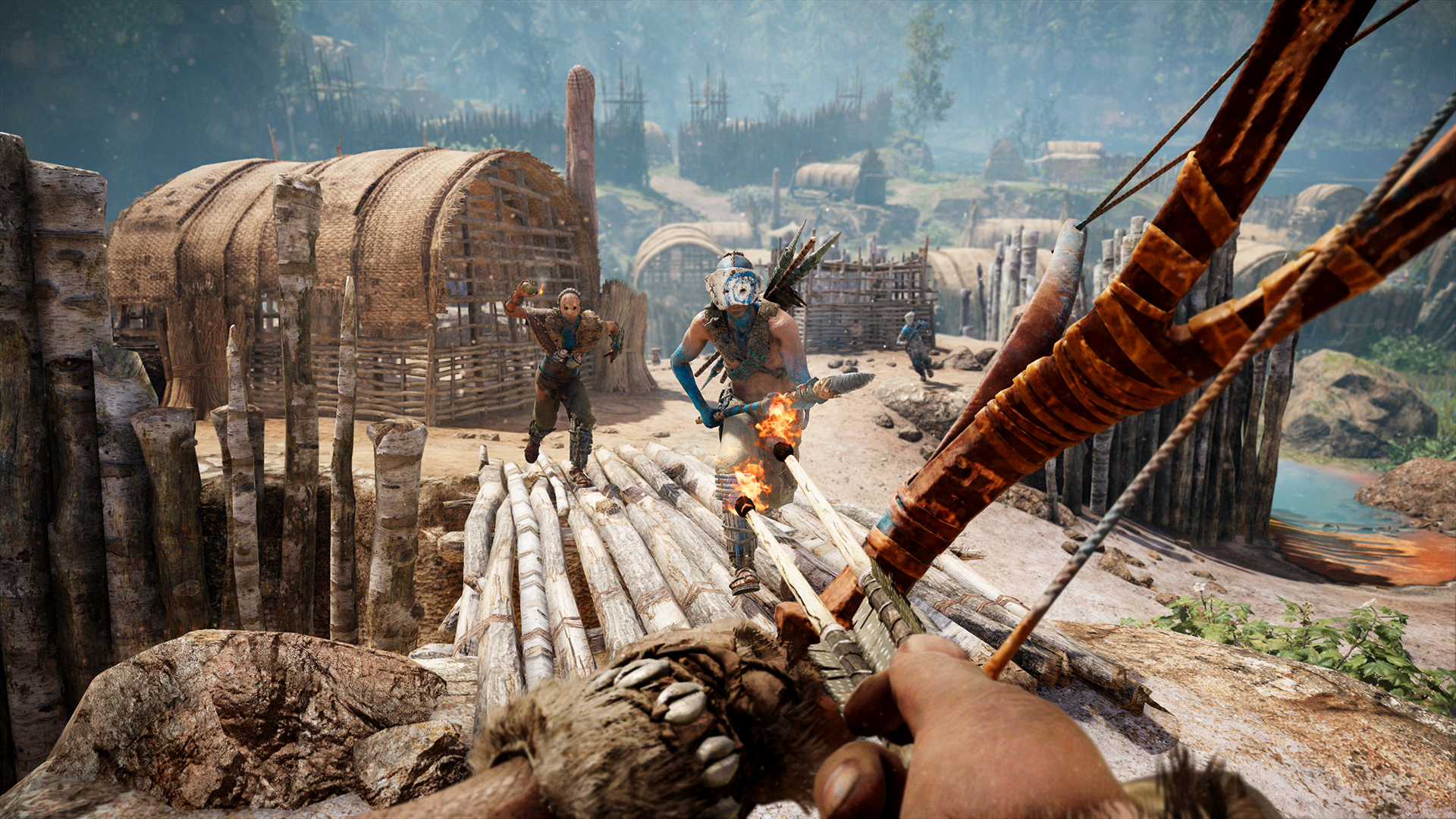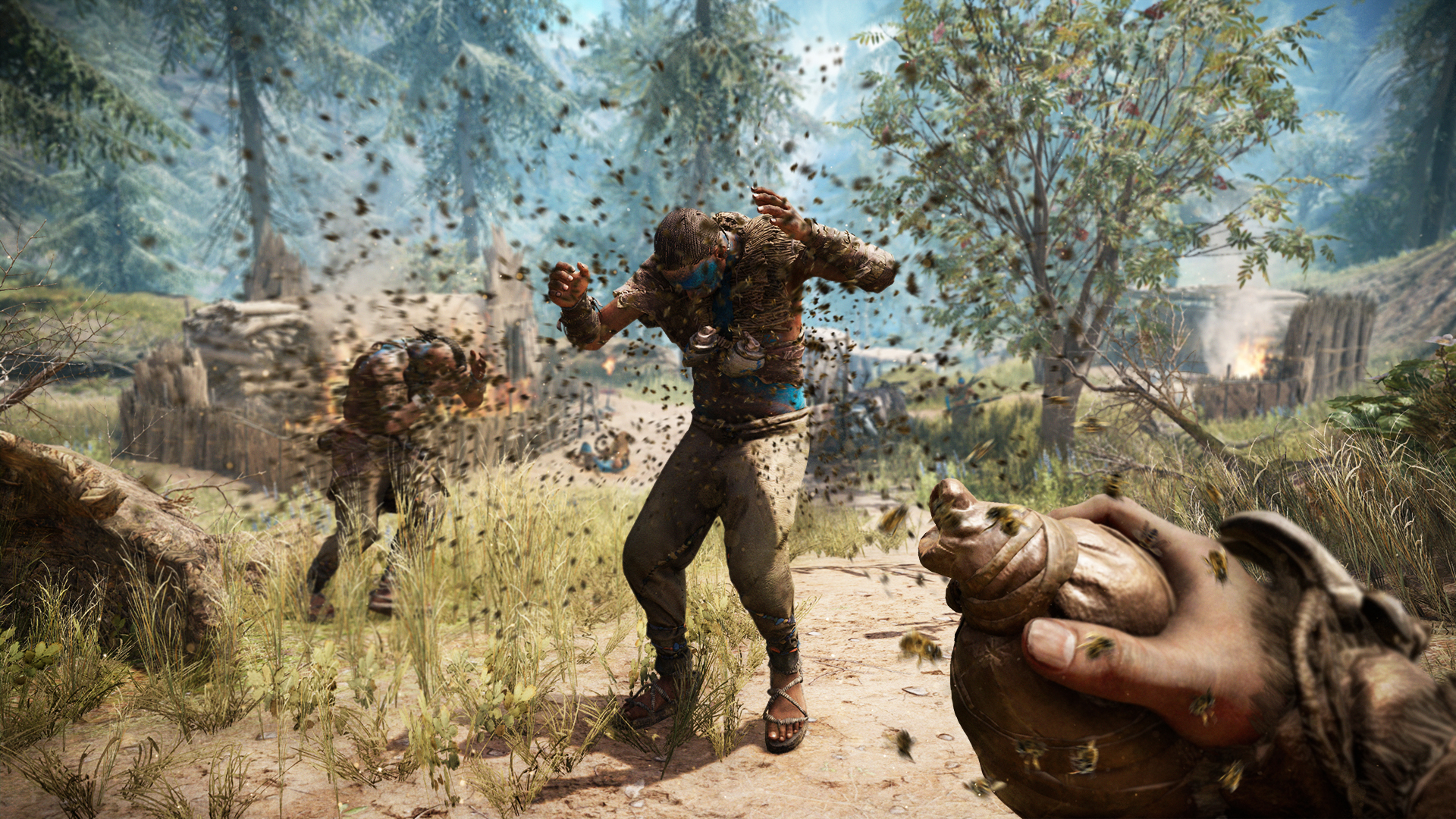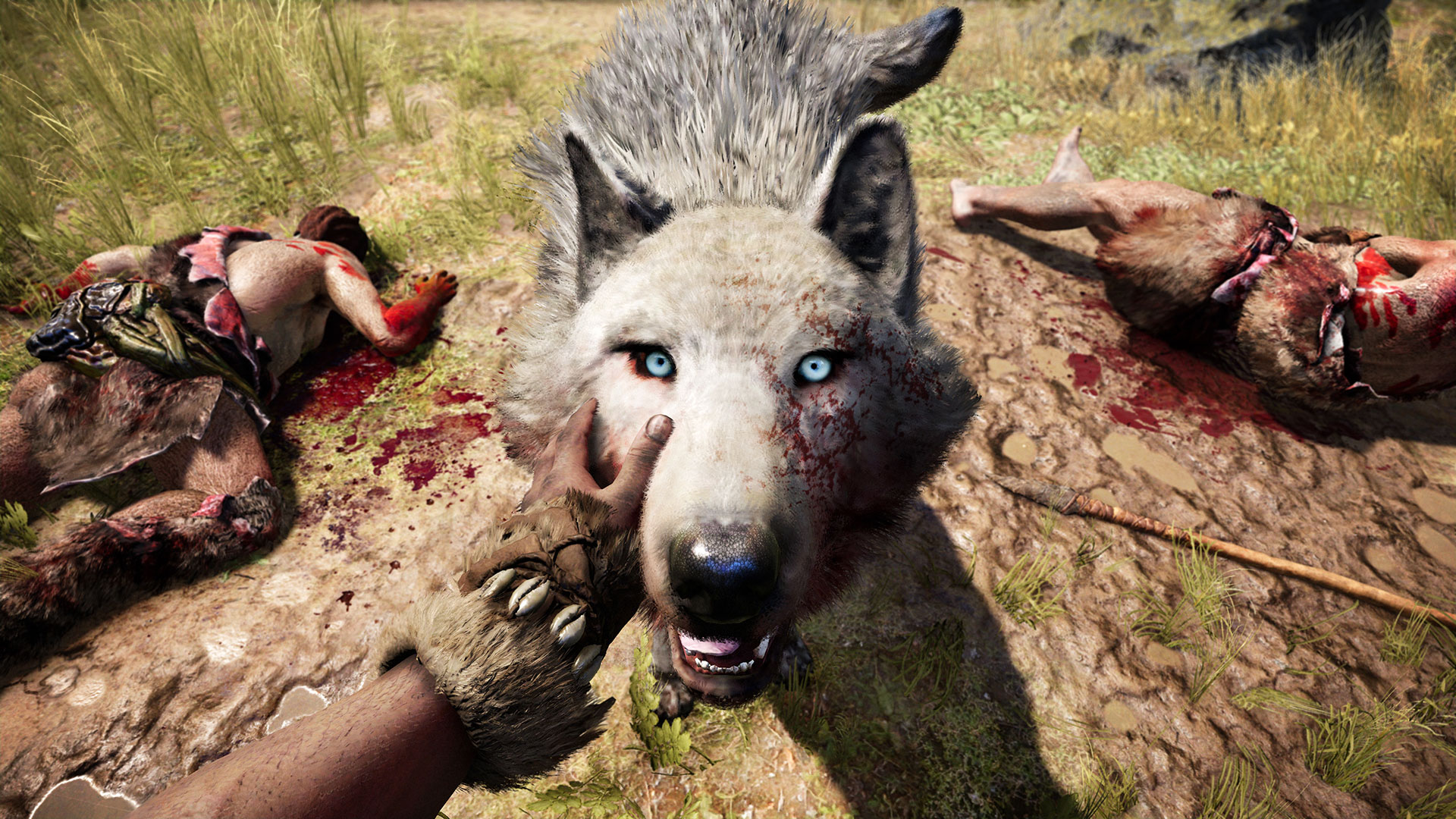
Let’s not beat around the bush about Far Cry Primal, available Feb. 23 for PC, PlayStation 4 and Xbox One. This is last year’s Far Cry 4 with a Stone Age makeover.
Instead of assault rifles and rocket launchers, you wield spears, bows and clubs. Collectible bracelets, cave paintings and luminescent paintings replace letters, Mani wheels and whispering masks. Rideable elephant bulldozers are now wooly mammoth steamrollers. The psychedelic Yogi and Reggie missions return as psychedelic spirit journeys. And grappling hooks are…okay, they’re still grappling hooks. (Who says anachronism has to get in the way of a slick gameplay idea?)
Ubisoft’s newest chapter in its series of open-world, first-person shooters takes place in Oros, the Mesolithic-era version of central Europe. It’s another bosky playground, only here you play a grizzled beast master named Takkar, taming wolves, leopards, jaguars, bears and sabretooths who’ll fight by your side. There’s even a thing where you “see” through the eyes of a bird (like Marc Singer in that old 1980s film), stealth-tagging targets without fear of discovery.
But not at the outset. After your hunting party’s slaughtered in the game’s first moments, you’re just a powerless neophyte wandering through prehistoric dells and primordial caves in search of other Wenja, the game’s moniker for your tribespeople. Eventually you learn the Wenja were attacked and scattered by the Udam, a pugnacious northerly tribe Primal‘s writers paint even more sinister by invoking cannibalism and giving their leering leader ghoulish features. Pieces of the last game’s quasi-magical elements resurface as well, amplified by the setting’s mythic elements, to the extent you could plausibly call Primal a fantasy-survival sim.
The survivalism angle was there in prior Far Cry games, but more as background noise. Stalking wildlife for skins and other animal bits to upgrade your gear was important but not central, and nonhuman predators were few and far between. In Primal it’s the inverse: leveling up requires deep engagement and mastery of the game’s revised hunting and crafting systems, as well as far greater caution as you explore.
Wander outside your village, and instead of watching mostly for bands of thugs, you’re in constant danger of being munched on by packs of preternaturally powerful wolves, terrifying sabretooths and tank-like mammoths. Primal stirs the pot further by shuffling where animals tend to hang out, adding predators when night falls. At one moment the map might be assuring you of harmless deer in the area, the next there’s a lethal ledge-climbing cave lion on the prowl. And since the story transpires circa 10,000 BCE, with humans in caves or primitive huts, sophisticated bulwarks don’t exist. That means enemies and animals can get at you almost anywhere, and you’re only as safe as your reaction times.

Other differences lie in the way you relate to Primal‘s world. In Far Cry 4‘s Himalayan-scape, you bounced from outpost to outpost, accruing experience points and toeholds on enemy turf. But home was wherever you were standing—all the crafting upgrades and unlockable skills fed the game’s army-of-one shtick. In Primal, you have a literal base of operations that harbors tribal specialists, each of whom require select resources to upgrade, both unlocking new abilities for yourself, and turning your wilderness toehold into a bustling tribal hub. At the gameplay level it’s just another layer to the leveling up process, but as the base evolves and your tribe grows, there’s a grounding visual component that’s been absent from the guerrilla feel of the series until now.
But in the end that stuff’s just there to rationalize Primal‘s best idea: tearing it up with your animal pals. Take the owl, your anywhere, anytime eyes in the sky. This is studio Ubisoft Montreal saying forget Far Cry 4‘s tedious sneaking around, here’s a bird of prey that can go anywhere and get you all the same info in seconds so you can just focus on your ground game. Oh, and the owl’s also a psychopathic super-killer, capable of swooping down and executing a hapless bad guy once every few minutes.

Or consider the beast master hunts, which emerge later in the game and let you unlock the strongest animal companions. These are grueling ordeals, with elaborate narrative setups and difficulty levels so extreme the game carries over to the next attempt any damage you’ve done to the beast each time it kills you. By the end, I was so caught up in the optional wildlife game that I’d lost interest in the “take out enemy tribes” one. The latter has its moments, but largely repeats Far Cry 4‘s escalating but repetitive fortress battles, and without Troy Baker’s delightfully unhinged turn as Pagan Min.
Yes, Far Cry with dinosaurs would have been cooler, but you have to respect what Ubisoft Montreal’s accomplished here: deftly using a low-tech setting to craft a counterintuitively breakneck adventure with that same “human pinball” feel. Far Cry 4 did it with ultralights and wingsuits; Primal manages with crazier wildlife and tighter crafting ties to the setting, not so much advancing as streamlining the elements that have made the series so deep and yet easy to drop in and out of.
4 out of 5
Reviewed on PlayStation 4
More Must-Reads from TIME
- Cybersecurity Experts Are Sounding the Alarm on DOGE
- Meet the 2025 Women of the Year
- The Harsh Truth About Disability Inclusion
- Why Do More Young Adults Have Cancer?
- Colman Domingo Leads With Radical Love
- How to Get Better at Doing Things Alone
- Michelle Zauner Stares Down the Darkness
Write to Matt Peckham at matt.peckham@time.com